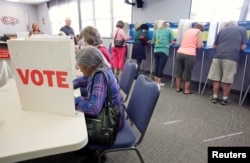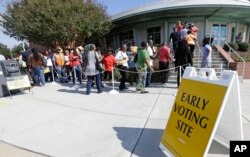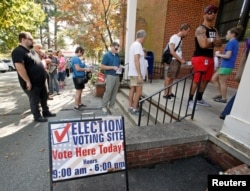One of thousands of early voters at the Guilford County Courthouse in Greensboro, North Carolina, Scott Herrick didn't mind the 45-minute wait to cast his ballot in the U.S. presidential election.
Voters on both sides of the political divide in this southern community appear to be highly motivated by the presidential contest between Democrat Hillary Clinton and Republican Donald Trump.
"I think the disparity between the two candidates is so pronounced it kind of made me just want to jump in my car and get out here and vote today," said Herrick, an Independent.
Early voting is off and running in the battleground state of North Carolina, where voters could determine the outcome of the national election. The race between Clinton and Trump is virtually tied in this state, according to pre-election public opinion surveys.
Early voting boosts turnout
Wearing a bright red baseball cap with the logo "Make America Great Again," Lewis Hutchinson waited nearly two hours to vote for Trump in Winston-Salem. The working-class city was once a world leader in cigarette manufacturing, but has seen thousands of job losses during the past several decades.
"The illegals are coming in here taking people's jobs. I am retired, but it still makes me mad to see jobs being lost," Hutchinson said.
Millions of Americans in 37 states will vote before Election Day on November 8, either by mail or at polling stations.
"The easier you make it to register and vote, the more people vote,” said Charles Prysby, a political science professor at the University of North Carolina at Greensboro. “It is going to increase turnout overall, but not exactly the same for both parties. The general belief is it benefits Democrats more than Republicans.
"Early voting can boost overall turnout at the polls between 2 and 3 percent," he said.
North Carolina election officials say early voting accounted for 56 percent of total votes cast during the 2012 election. Analysts say more than 46 million people across the country are likely to vote early. Overall, 125 million people are expected to vote in this presidential election.
Voting law controversy
Voting rights have been the source of major political and legal battles in North Carolina since 2013. That's when the Republican-controlled legislature passed a law limiting early voting to a week, and required voters to show photo identification. Lawmakers said the aim was to prevent voter fraud.
"We strongly supported our state's voter ID laws and believed it was essential that we have common sense protections that people are who they say they are when they go to vote," said Ricky Diaz, a spokesman for the North Carolina Republican Party in Raleigh.
An appeals court struck down North Carolina's voting law earlier this year, citing evidence that lawmakers used data on black voting patterns before crafting the legislation.
"Do not let anybody suppress your right to vote, because I remember the time when my ancestors could not vote,” said African-American voter Thomas Fowler. “But we have a right and an opportunity to vote, and I think we should."
The controversy surrounding voting rights motivated others to cast their ballot early.
"I think it's necessary for folks to have the option of early voting and to deny that is denying us the process for which we get to speak about our elections," said Chris Winchester, a Democrat. "I think early voting is necessary because it gives people the freedom to come when they can. If you narrowed it down to one day, the lines would be extremely long, and people who can't take off from work could simply not be able to vote."
Geba McDanial brought her 14-year-old son, Malik, with her to vote. He's not eligible to vote until he turns 18, but his mother wanted him to see the process.
"It's an honor for us to vote as African-Americans, so for me to express that and show him that it is truly something he should do throughout his lifetime,” she said.
Protecting the vote
In recent weeks, Donald Trump has told supporters to be on the lookout for vote rigging or voter fraud.
Outside polling places that VOA visited in North Carolina, attorneys representing both political parties were on hand to report irregularities.
"I am just monitoring how voters are being treated with a focus on voter registration and voter protection," said Washington, D.C., attorney Arezo Yazd, who spent a week in North Carolina representing the Clinton Campaign.
Local election officials say there have been no major problems since early voting began October 20.
"From before the voting began until after it ends, everything is thorough and extensive in terms of the safeguards and procedures that are in place to ensure the integrity of the election," said Tim Tsujii, Director of Elections in Forsyth County, North Carolina.
Despite Trump’s claims of a rigged election, analysts say the risk of such activity is extremely low.
"There is absolutely no significant problem of voter fraud in the United States," said political analyst Prysby. "There have been lots of cases suspected, but almost all the cases that have been investigated, it turns out it wasn't an actual attempt to fraud. … I think it's really disappointing that you have people making these allegations, unsubstantiated allegations and undermining the confidence we should have in the elections."








